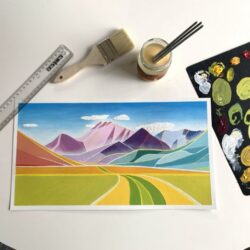The National Library of Australia recently secured funding to continue providing it’s wonderful Trove website, but I was surprised to learn that only 10% of it’s resources have been digitised so far, and the funding doesn’t address this task. In their appeal for funding for the big job ahead, the Director-General of the National Library is encouraging people to find their place in Trove. No doubt we will realise how valuable and interesting the items are, and realise how much is missing. What stories lie in these papers which obviously still haven’t been scanned into an electronic format?
I love to dig into Trove, looking for for more stories about my ancestors – things which the official records don’t tell. In his book “Why Weren’t We told?”, historian Henry Reynolds describes having to scroll for many hours though microfiche in libraries and go through stacks of regional newspapers which had never been touched since they were first published. Now, we amateurs can explore some of these materials from the convenience of our computer.
I had no idea what sort of things went on in society or my family until I started building my family tree and exploring sources like Trove and the British newspaper Archives. In the months ahead, I’ll share some items I’ve found and I hope you will too. Be prepared for a few shocks! It has been said that you find what you search for, but in my experience, you also find thinks you’d never imagine. And what you find changes you!
Trove Tips
- Search with a few keywords, but sometimes a string of words enclosed in quotes works better.
- Start a specific search then try spelling variations and synonyms.
- Start broad, see what you get, then narrow down for better results.
- Narrow down to a particular decade and publication. This is useful if you want to find out what went on at a place in 1840 not 1940.
- Try the Advanced Search features.
Apart from money, you can contribute to Trove by spending a few minutes fixing the text for the article you found. Trove uses software to produce text from the image, but sometimes the lettering is too patchy. But your eyes and brain might make sense of it. When you fix the text, you might help another people find something important in the future. You must sign in before you can edit, but registration is free.
We look forward to hearing about your Trove discoveries. You could take screenshots or download the text of the articles, and paste these into a rough document. There’s no need for deep research, just make sure you have the article text, date and publication included. Please send your discoveries using our contact form and selecting Research. Or if you’re a member, you can attach your document to an email and send to:
webeditor@hafs.org.au or research@hafs.org.au if you’re planning to write an article for our Journal.
You can also create a draft a post by pressing New on the menu bar at the top of this screen. Just start typing, copy and paste your findings from Trove, and press Save Draft, then we’ll format it and publish the post.


